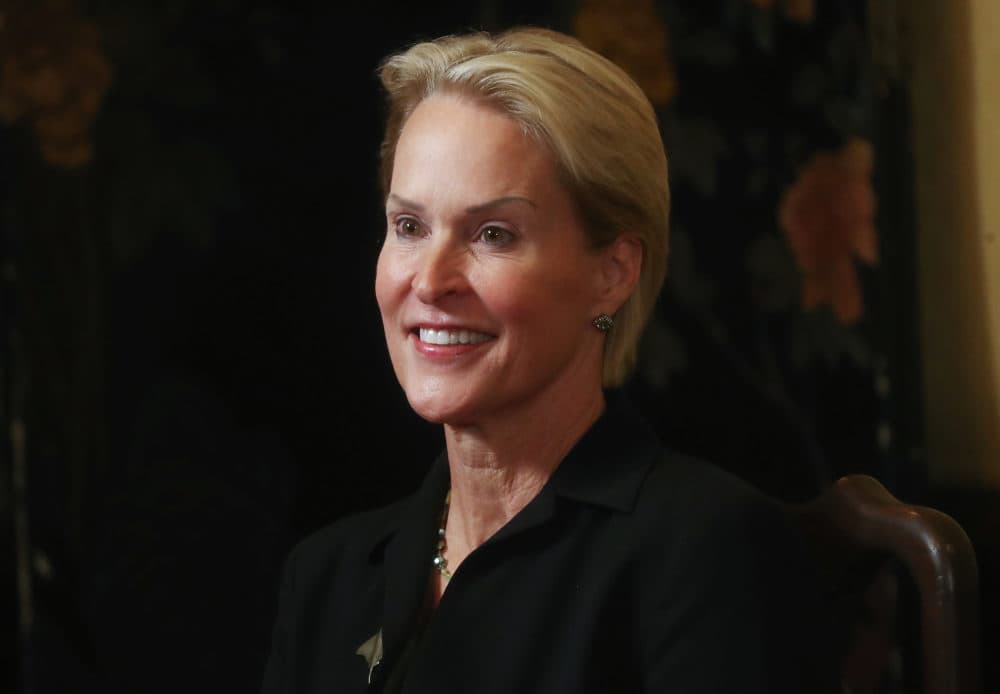Advertisement
View From The Top
Nobel Winner Frances Arnold Reflects On Becoming 5th Woman To Win Chemistry Prize

This year's Nobel Prize honorees include Canadian Donna Strickland — only the third woman ever to win the Nobel Prize in physics — and Frances Arnold, an American who is the fifth woman in history to win the Nobel in chemistry.
Arnold shares the prize for her work changing how chemists produce new enzymes, which has led to new pharmaceuticals and cancer treatments.
Arnold (@francesarnold), a professor of chemical engineering at the California Institute of Technology, tells Here & Now's Jeremy Hobson she was sound asleep when she was announced as the winner.
"That tells you how much I was expecting it," she says. "And of course I was tremendously surprised, terrified and overwhelmed and thrilled, all at the same time."
Arnold is also a breast cancer survivor, and her Nobel win comes after significant personal losses: the death of her first husband to cancer, another partner who died by suicide and the death of her son William, who was killed in an accident in 2016.
"I miss the people that I love and who are gone. I miss my father. I miss my partners. I dearly miss my son," she says. "But on the other hand, everyone has to go through these things. Life is not a piece of cake, and it certainly is not for many of the people I know."
Interview Highlights
On what her work on "harnessing the power of evolution" entails
"If you look at the biological world and all the amazing chemistry biology does, it comes about through this one simple design process called evolution: Everything in the biological world is a product of this 4 billion years of evolutionary work. I'm interested in using evolution to move forward into the future, to get biology to do a lot of new chemistry for us.
"People have been using evolution for thousands of years to breed everything from corn to carrier pigeons, lab rats, race horses, hairless cats — why not do it with molecules? We take the DNA that encodes biological molecules that are useful to human beings, and we breed those molecules in the test tube, just like we've been doing for animals and plants."
"I've seen brilliant women come up through the ranks, doing amazing chemistry, physics, biology. My prediction is we'll see a steady stream of those winning Nobel Prizes in the future."
Frances Arnold
On what first got her interested in chemistry
"I got interested in chemistry as a graduate student. My first course where I looked at the structure of an enzyme, I was blown away by the beauty and complexity of just the simplest biological things. I had a degree in aerospace engineering and always thought I would engineer the most complicated things on the planet. Well, I discovered those, and it's called biology."
On working as a cab driver at one point
"Early on, yes. You made more money as a cab driver than working in a pizza parlor."
On being one of few women to have won the Nobel Prize in chemistry
"I think the 'so far' ... is the most important point. I was one of the first women in engineering at my undergraduate institution, at Princeton. I was one of the very first women hired even at Caltech as a professor. So in that sense, there weren't very many women who could compete. That's changed completely. I've been at Caltech for 30 years now and I've seen brilliant women come up through the ranks, doing amazing chemistry, physics, biology. My prediction is we'll see a steady stream of those winning Nobel Prizes in the future ... because they're brilliant. Their work is brilliant.
"Also, the Nobel Committee has made a conscious effort to get more nominations. You don't get a Nobel Prize unless someone takes the time and trouble to nominate you, and the committee has taken on that task to make sure that women at least get nominated. Then they can be considered. And when you consider women, you'll see their chemistry is beautiful."
On whether she feels a responsibility to encourage women and girls to excel in science
"I feel a responsibility to encourage everyone to excel in science. Science is so important for the future of our country and the future of the world. Otherwise, how will we be able to feed 10 billion people and live sustainably? So we need all of the minds, and women are half of our population. It would be crazy not to encourage women. But I'm talking about everyone — everyone needs a scientific background to be an educated person, and even better, they might become scientists themselves."
On winning the Nobel Prize after the deaths of her partners and son
"I'm very grateful ... that these people were in my life, and I'm very grateful for the people who are still in my life, and that's the way that I move forward, is I look at all the wonderful things I have, rather than spend my time fretting about what I don't."
"We all need friends, and friends are there to hold you up when nothing else can. I am very lucky to have a wonderful institution I work for, Caltech is a place where I have many friends, and I have many friends outside of Caltech who've been there for me."
Ashley Bailey produced and edited this interview for broadcast. Jack Mitchell adapted it for the web.
This article was originally published on November 28, 2018.
This segment aired on November 28, 2018.

